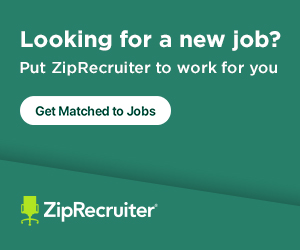We may earn a commission if you click on a product link and make a purchase at no additional cost to you. For more information, please see our disclosure policy.
Last Updated on April 10, 2025
A friend of mine (let’s call him Phil) just started his job search and he asked me to review his resume. When I started talking with Phil about his resume, I realized that he had not given any thought as to the type of company he wanted to work at, the types of jobs he was considering, where he would start his search (recruiters,
While your resume is the most important document in your
There are many reasons to launch a
Save time and get more interviews with AI. Upload your current resume to get a professional version for FREE. We use AI to scan through millions of jobs each day and provide you with your top matches based on your profile and preferences
Where to Start
- Clearly Defined Career Goals – Start by outlining your career objectives. Knowing what industries and roles align with your
skills , passions, and long-term ambitions will guide yourjob search . Having clear goals will help you focus on opportunities that best suit your professional development and help you avoid wasting time on irrelevant positions. - A Target List of Companies – Create a list of companies that match your values and career aspirations. Research their missions, work culture, and recent activities to ensure they align with your goals. Targeting specific companies will allow you to tailor your applications and showcase your genuine interest, helping you stand out among applicants.
- An Updated Resume and
LinkedIn Profile – Ensure your resume and LinkedIn profile accurately reflect your currentskills , accomplishments, and experience. Tailor these documents to the job roles you’re seeking by highlighting relevant keywords from the job descriptions. Having well-optimized profiles will make it easier for recruiters to find you.
Get 10X more Job Interviews with JobCopilot. Automatically apply to jobs from 50,000+ companies worldwide
- A
Job Search Timeline – Set a structured timeline for yourjob search . Plan key dates for submitting applications, attending interviews, and following up with networking contacts. A well-organized timeline keeps you on track and ensures that you don’t miss critical deadlines or opportunities during your job hunt. - A Strong Professional Network – Networking is essential for your
job search . Engage with professionals in your field by attending industry events, joining online groups, and reaching out to colleagues or alumni. A strong network can provide valuable job leads and recommendations that may not be publicly advertised. - Interview Preparation – Be ready to ace interviews by practicing answers to common questions and preparing examples that demonstrate your achievements. Research the companies you apply to and think about how your
skills align with their needs. Interview preparation will boost your confidence and increase your chances of making a strong impression.
- Job Search Goals – Set measurable goals to keep yourself accountable during your
job search , such as applying to a certain number of jobs each week or reaching out to new contacts regularly. Consistent action and goal-setting will help you stay motivated and organized as you pursue job opportunities. - Tailored Cover Letters – Write customized cover letters for each
job application . Highlight how your experience aligns with the specific job requirements. Tailoring yourcover letter shows employers that you’ve taken the time to understand their needs and increases your chances of standing out from other candidates. - An Organizational System – Keep track of your job applications, deadlines, and follow-up activities. A spreadsheet or
job search management tool can help you stay organized and ensure you don’t miss important details or communication from potential employers. Being organized will streamline yourjob search process. - Resilience and a Positive Attitude – Rejections are a natural part of the job search. Stay resilient and view setbacks as learning opportunities. Maintaining a positive attitude will keep you focused and help you stay committed to finding the right opportunity, even when the process takes longer than expected.
Resume review, cover letters, and interview preparation. Learn about the critical mistakes you may be making in your resume and cover letters. Find out how to fix it and start getting job interviews.
Your Job Search Plan
You can’t execute a plan if you don’t have one. Don’t worry, this is not about spending all of your time creating a plan, but you do need to know how, where, and what you will do in your
Use the latest technology to target potential employers and secure the first interview--no matter your experience, education, or network--with these revised and updated tools and recommendations.
What You Will Need:
-
Documents you will need (marketing plan):
- Resume(s) – Probably more than one, more on this in Creating a Modern Resume.
- Supporting documents – A shortlist of your resume (company names, education, and internships with start and end dates)
- Cover Letters
- Thank You notes
A complete guide to finding a job online explains how to find the thousands of job listings on the Web, use the leading career websites, create an electronic resume and cover letter, research companies via the Internet, find online contacts and network, and more.
-
Lists you will create:
- Your strengths and weaknesses
- Jobs you are qualified to apply for
- Companies where you would like to work (including those that are in your industry)
- Your Network (friends, family, current and former coworkers)
- Recruiters for your industry/field
- Job search boards (keep this list short)
- References
-
Other actions you will take:
- Utilize your
College Career Office (tons of resources) - Build and leverage
your network (friends, family, LinkedIn, etc.) - Prepare your marketing materials (Resume, Cover Letters, interview questions)
- Prepare your marketing plan (companies, recruiters, job boards, etc.)
- Utilize your
Where to Start:
Your first step will be to create some of your lists (see below). This will enable you to create a resume that best matches your qualifications and will provide the best chance of landing a job quickly.
Step 1 – Make a list of jobs you are qualified to apply for. This should include jobs that are at your current level as well as the next level up.
Step 2 – Research companies where you would like to work (and that have your type of job). Make a list and prioritize (favorite to least favorite).
Resources:
→ How to Build a Job Search – Company Research
→ 8 Resources to Help Find the Right Company for Your Next Job
Step 3 – Create or update
Resources:
→ Free Resume Evaluation Service
→ CVs Made Easy
Whether you're a seasoned professional in search of a career change or a beginner just entering the working world, you want to make the right choices from the beginning.
Conclusion
A successful job search requires thoughtful planning, clear goals, and consistent effort. By defining your career objectives, organizing your applications, and leveraging your professional network, you can significantly improve your chances of finding the right opportunity. Staying persistent and proactive, while continuously refining your approach, will help you stay on track and achieve your career aspirations. Keep building your skills, stay resilient through challenges, and remain open to new opportunities along the way.
Additional Resources
-
 Get Matched to Jobs
Get Matched to JobsNever miss an opportunity. On ZipRecruiter, top companies reach out to you.
There's no need to look anywhere else. With over 9 Million jobs, ZipRecruiter is the only site you'll ever need to find your next job.
We earn a commission if you click this link and make a purchase at no additional cost to you.
-
Find Your Flexible Job Now
We earn a commission if you click this link and make a purchase at no additional cost to you.
-

$17.99$12.45Buy on Amazon.com Buy on Walmart.comFeaturing interactive exercises, real-life examples, practical dos and don'ts, and other essential tools, this book explains how to:
- create a personal brand online,
- communicate with potential employers via email,
- and leverage personal stories throughout the interview process to get noticed and get hired.
We earn a commission if you click this link and make a purchase at no additional cost to you.
07/05/2025 04:07 am GMT -
 Land Your Dream Job
Land Your Dream JobResume review, cover letters and interview preparation. Learn about the critical mistakes you may be making in your resume and cover letters. Find out how to fix it and start getting job interviews.
We earn a commission if you click this link and make a purchase at no additional cost to you.
-
 Buy from Amazon.com
Buy from Amazon.comob Search: Fundamentals of Effective Job Hunting, Resumes, and Interviews will help you develop those skills. In Job Search, you will be given step-by-step instructions on writing a resume that stands out and building a search-optimized profile that shows up on the top of potential employers’ lists.
We earn a commission if you click this link and make a purchase at no additional cost to you.
-
 Buy on Amazon Buy on Walmart.com
Buy on Amazon Buy on Walmart.comDon't waste days, weeks and months following the job search "rules." Learn how to take charge and get offers for the work you love at the price you're worth.
We earn a commission if you click this link and make a purchase at no additional cost to you.
-
Explore & Get Started
Explore Career.io, the only Al and human-powered platform where you can find everything you need. For any step of your job search or career growth. All in one place.
Career.io is our trusted partner. If you subscribe to the platform, we may earn a commission (at no additional cost to you)
-
Get Started
Top quality job openings near you, with the highest pay and best compensation.
We Apply to $100K+ Jobs for You. Fill out one form, just once, and say Goodbye! to endless job applications
We earn a commission if you click this link and make a purchase at no additional cost to you.
-
 $7.99Buy on Amazon.com Buy on Walmart.com
$7.99Buy on Amazon.com Buy on Walmart.comFind a job that makes you happy in 7 detailed steps-clear scripts, outlined stages, proven techniques-this book contains everything you need, every step of the way.
We earn a commission if you click this link and make a purchase at no additional cost to you.
07/04/2025 06:01 pm GMT -
Try it now
Get 10X more Job Interviews with JobCopilot. Automatically apply to jobs from 50,000+ companies worldwide
We earn a commission if you click this link and make a purchase at no additional cost to you.
Joey Trebif is the pen name of Mark Fiebert, a former finance executive who hired and managed dozens of professionals during his 30-plus-year career. He now shares expert job search, resume, and career advice on CareerAlley.com.







